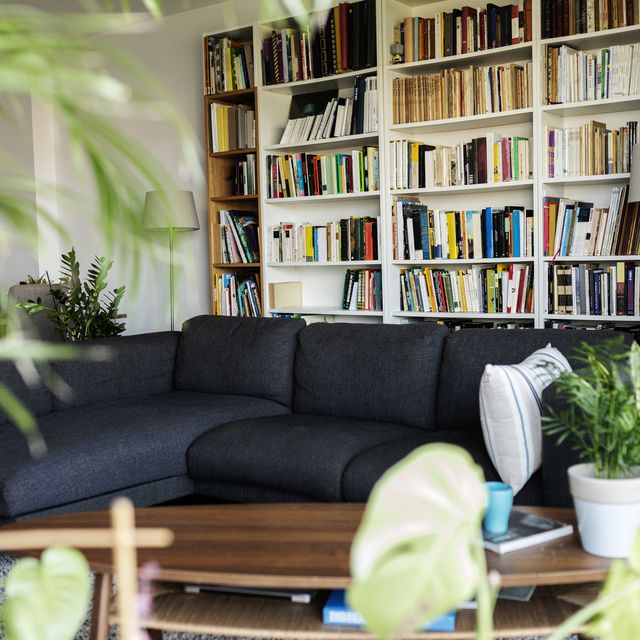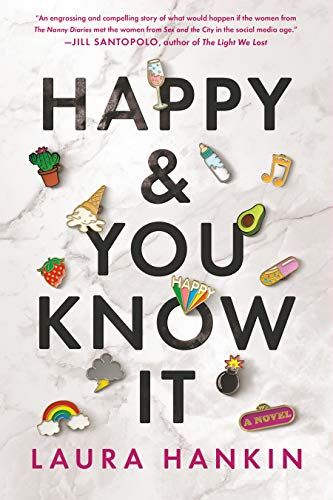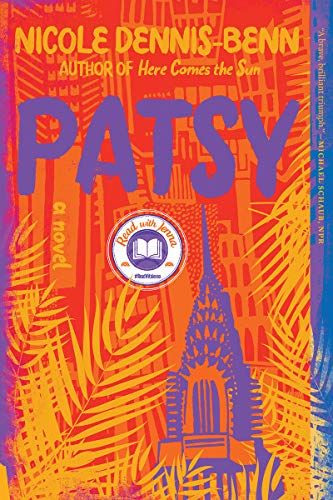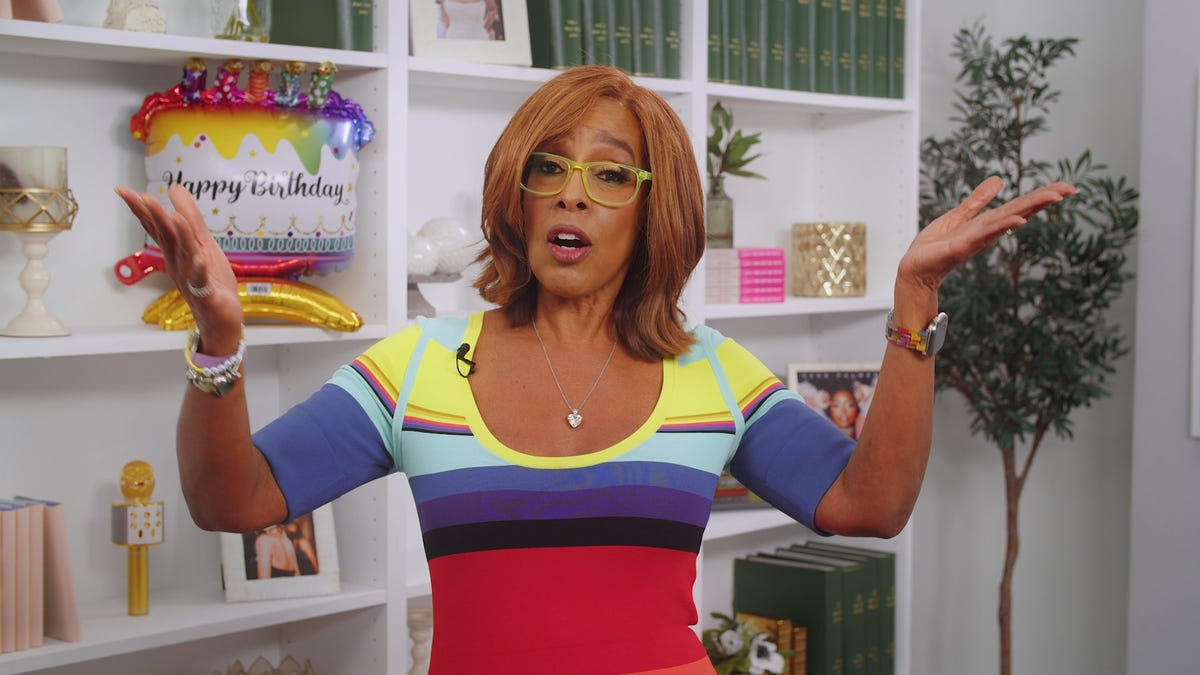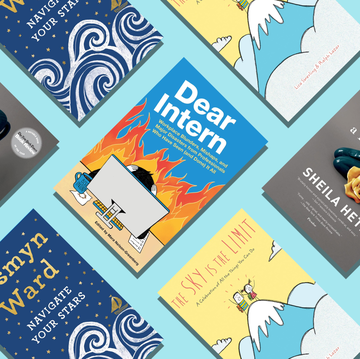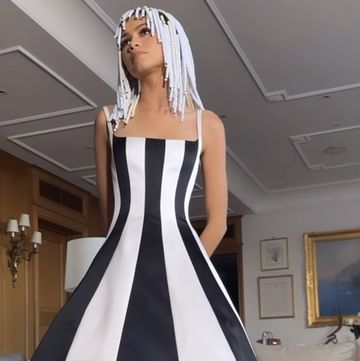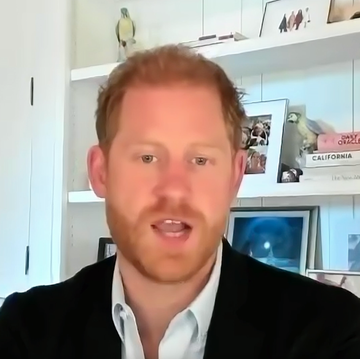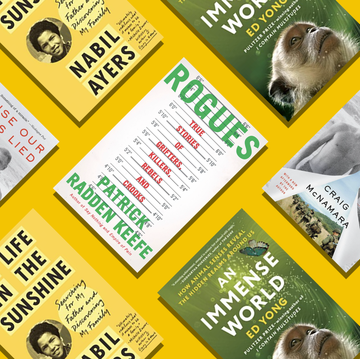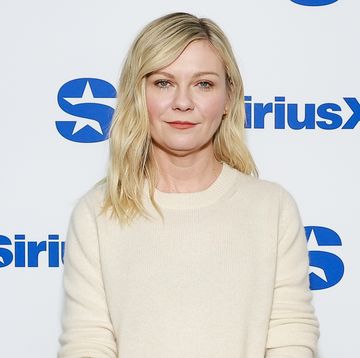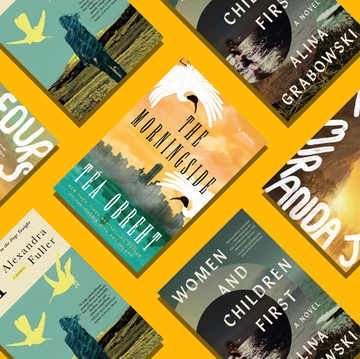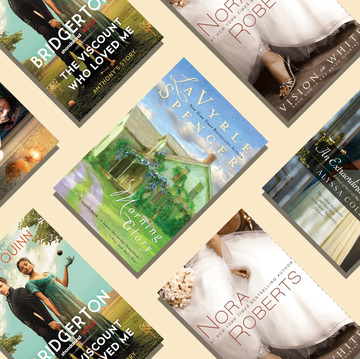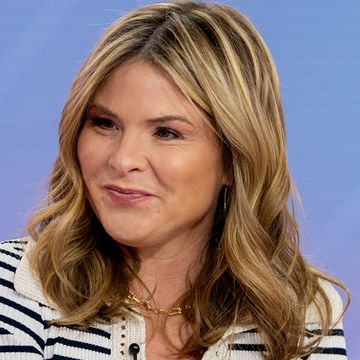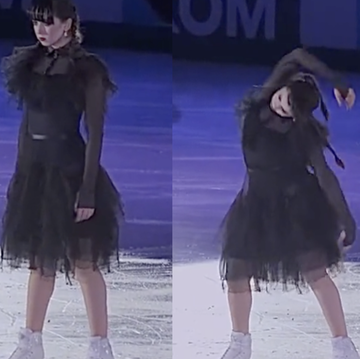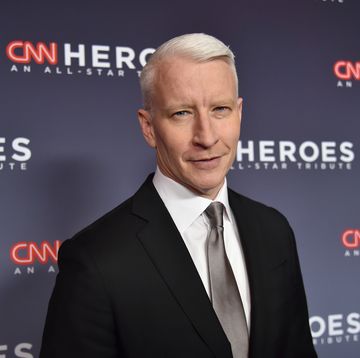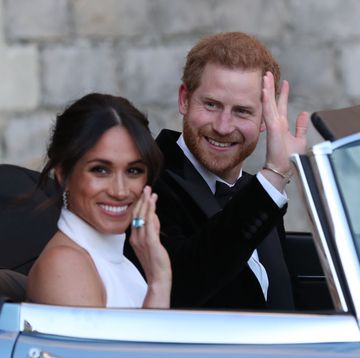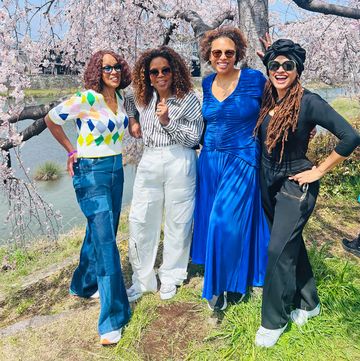Novelist Laura Hankin found out that the launch event for her second book was cancelled through a Facebook notification from the bookstore. “I cried very hard. But then I also was like, how dare you cry over a canceled book event? That doesn't matter,” Hankin tells OprahMag.com. “It was just another bit of uncertainty amidst a whole world of uncertainty.”
Hankin’s novel, Happy and You Know It, was released May 19, about two months after the coronavirus forced much of the United States to shelter in place and work from home—a time when bookstores were cancelling events left and right and authors were forced to call off their promotional tours.
Now, Hankin is one of many authors, publicists, and booksellers who are figuring out the publishing world’s “new normal,” which has meant participating in Instagram Live events, answering questions on moderated Zoom chats, or—like Hankin did—making music videos.
Hankin decided to process her own mixed feelings in a song called “Indoor Book Tour.” Using cheeky lyrics about being stuck on the couch and having the in-person audience of a single cat, “Indoor Book Tour” highlights the solitude of what had once been the active, social act of book publicity.
Months after Hankin created her music video, and authors have still yet to resume what was once the standard: national tours to promote their releases by visiting bookstores, signing books, and connecting with readers in-person.
“I miss that thing that can happen with different audiences,” Lily King, the author of the Read With Jenna pick Writers and Lovers, tells OprahMag.com from her home in Maine, where she conducted her own virtual tour. “Every audience has a different personality. Even if they're not saying anything, they're each giving off a vibe that's different from every other group that you've spoken to in a different location.”
Book publishing, like nearly all industries, has been affected by the coronavirus pandemic—though in some ways, for the better. After a brief decline in March, sales saw an uptick. In June, sales in print books in fiction overall rose 31.4% in the U.S. from May, according to figures from NPD BookScan, and the e-book market is similarly booming. Publisher’s Weekly credits the spike in print sales to children’s books and works on social justice, which crowded the bestseller charts in the wake of George Floyd’s murder and the widespread protests since.
Amidst this increase in interest around reading, there has been a push from authors, booksellers, and publishers to support independent bookstores by purchasing books directly or attending online events. "Every sale makes a difference," A.N. Devers, the owner of the Second Shelf in London, tells OprahMag.com.
Still, for the publishing world, there are many uncertainties. Are virtual events a way of treading water until there’s a vaccine, and authors can begin traveling again? Is this collection of mostly free online events the new normal? And if so, how can technology rise up to continue to meet demand as time goes on?
What is certain is that the process of promoting books will never be the same—and it can’t be. The very idea of a line of excited readers waiting for their books to be signed—in close proximity to one another in cramped but cozy bookstores, books passing from hand to hand—is enough to send a coronavirus epidemiologist into a panic.
But while authors are mourning the tours of yesteryear, it’s also possible the online book tour offers something even better than “before.” Today, no matter where a book lover lives, they have no shortage of star-studded events they can catch from their living room, with curated weekly schedules and calendars of offerings hosted by local bookshops, nonprofits, or festivals. Viewers can hop-scotch from Zoom live-stream interviews to webinar writing workshops to quarantine-themed reading series, and even catch up at their leisure on videos that are saved—no New York or L.A. zip-code required.
What started as a temporary solution is now pushing writers and publishers to rethink what, exactly, a book event should look like. By now, the book tour is an institution. Famously, in 1842, Charles Dickens was treated like a rock star upon arriving in the U.S from the U.K. on a transatlantic boat. While today most modern book tours don’t have the fanfare of a crowd welcoming a ship at the harbor, they are still a fixture of publishing—a celebratory rite of passage for those who have spent many solitary months writing alone.
Today, when an author’s book comes out, publicists at publishing houses coordinate locations for in-person events, which can range from stops at town libraries to selling out entire arenas (see: Michelle Obama’s unprecedented Becoming tour). For authors, in-person tours are defined by grueling travel schedules, time on the road, and hoping people actually show up at their events.
By virtue of being virtual, the tried-and-true model of a book reading, intimate Q&A, and book signing—all of which once lured readers to stores—may no longer hold the same interest. And authors have no choice but to embrace the new mode.
For the launch of her newest story collection I Hold a Wolf By the Ears in late July, Laura van den Berg had an event that she says would have been “impossible” to coordinate in real life: A rotating, all-star cast of short fiction scribes discussing their writing process, including Kristen Arnett, Lauren Groff, Danielle Evans, Karen Russell, and Jennine Capó Crucet.
Boys of Alabama author Genevieve Hudson staged something similar for the launch of her debut novel. For an event hosted by Thank You Books of Birmingham, AL, Hudson held a veritable parade of writer friends on Instagram live including Chelsea Bieker, Peter Kispert, T Kira Madden, Dennis Norris III, and Nick White. She says the stream felt more like a party, one full of spontaneity and joy.
“The fun thing about having a digital event is that people can just join,” Hudson says.
In the “before times,” events like Hudson’s and van den Berg’s may have been limited by geography or a price of admission. And often, these events take place in coastal towns or urban cities. But now they’re free, accessible—and exuberant, too.
Clearly, one benefit of online events is accessibility. Grove publicist Kait Astrella says that the attendance of her author’s virtual events are double what they would have been in-person. “We are reaching people we couldn’t have reached before,” she says.
But this level of accessibility also has a downside: Harassment. C Pam Zhang’s debut novel, How Much of These Hills Is Gold, was released in April. It was quickly named Goop’s first book club pick, and was recently longlisted for the Booker Prize. Amid her celebratory release week of appearances on Seth Meyers and online events, Zhang was faced with the unexpected.
“There’s an event I did with another Asian American author where there were racist trolls dropping slurs into the group chat,” Zhang says.
Experiences like Zhang’s have led publishers and bookstores to experiment with technology that blocks comments and monitors audiences, allowing readers to interact while still protecting their authors. By the time author Meredith Talusan went on tour in May for her memoir Fairest, bookstores had already taken security measures to ensure a safer experience.
“A number of friends had terrible experiences early in the pandemic, but by late May when I released my book, Zoom had introduced security features and bookstores got more careful, so I didn't experience any harassment thankfully,” Talusan says. “The downside, though, is that there was probably less interaction than we would have had if there weren't those precautions.”
Virtual events also pose one more existential challenge: Authors and their publicity teams must be creative in differentiating each event within the “tour.” Otherwise, why would one person attend multiple talks for the same book? “There's some diminishing returns on virtual events,” Veronica Roth, author of The Chosen Ones, says.
So she’s found success in creating themed talks, like discussing a different topic with a different writer each session. “Otherwise it's like, ‘I saw you talked about this last week, so I'm not going to tune in again.’”
Further, these events aren’t guaranteed to actually move copies, even if they bring in an ample audience. Speaking to OprahMag.com, novelist and bookseller Ann Patchett revealed an event her Nashville store, Parnassus Books, did in coordination with Book Passage in Marin, CA brought in 3,500 viewers—but only sold 18 books, between the two stores.
Some fans follow authors on social media. But Zhang, who has done events with stores that weren’t originally on her three-month tour roster, has found a sense of locality on the internet—users follow stores, not authors. So instead of visiting Brooklyn’s Books of Wonder as they normally would, they’re going to the Books of Wonder events. Until they can be back in that crowded bookstore, surrounded by others, this online community will do.
Despite the format changes, the most fundamental difference for authors comes in the emotional experience of the tour, for better or for worse. Roth has been enjoying the elimination of certain obstacles associated with in-person events, like travel and social anxiety—in fact, she says her Chosen Ones launch, spent with her husband and dog, was her most celebratory yet.
But the virtual book tour isn’t an introverts’ paradise. “I stress out a lot more after virtual events. I wonder if the people had a good time...it feels more uncertain," Roth says. Without the flush of the crowd or the applause, without the signing line and the afterglow, Roth has no way of knowing whether the event went well. Instead, she simply shuts her computer and returns to her quiet apartment.
King, who has taken to squeezing stress balls to calm her nerves during events, also shares that Zoom induced-anxiety. “I find that these Zooms take more effort than standing at a podium and getting feedback from an audience. There's a give and take of energy in a real life situation. On Zoom, audiences feel much more anonymous, so they don't have to give you any feedback. You don't know if your jokes are landing.”
However, readers are treated to a new kind of intimacy: They get to see their favorite authors’ writing rooms and living spaces—and potentially judge them, too. King lives in low-grade fear of readers zooming in and analyzing the shelves in her backdrop. “They're not even my favorite books. It just makes me really uneasy. It's like, ‘No, no, don't judge me!’" she says.
In the wake of Zoom Rooms taking the place of gathering spaces due to the pandemic, an entire cottage industry of “room rating” accounts has sprung up online. Hankin even spoke to a media consultant to make her backdrop worthy of at least a 9 on the twitter account “Room Rater.”
From fuzzy internet connections to bookshelf spying, an interview on-screen may feel different than a packed New York reading—but both have the same goal. That’s why when it comes to wardrobe, many authors are still treating the virtual events as if they were in-person.
“I can’t talk about my book in pajamas,” says Nicole Dennis-Benn, author of the novel Patsy, a Read With Jenna pick. “I love fashion, and I'm one of those writers to bring multiple outfits for tours as well. I still want to give that energy, that upbeat vibe, that same style. I wouldn't want to give that up just because I'm online.”
Other authors take different approaches—from now on, for example, Van Den Berg is only concerned with the top half of her outfit. “I’ve worn sweatpants, which of course no one can see, to every single event thus far, and that has been absolutely fantastic,” she says. Ultimately, she feels liberated from the pre-event tug-of-war between comfort and style. “I no longer have long internal debates about wearing shoes that are super cool but not super comfortable, versus my less exciting but very comfortable ones,” she adds.
Roth made a switch from choosing outfits to focusing, instead, on makeup, experimenting with a different shade of lipstick for each event. “It helps you transition into a different state of being, even though you're in the same place,” Roth says.
Even stuck at home, authors feel compelled to dress up because of the brand new view they’re getting during these events: Not the audience, but themselves. “We're all getting so much weird mirror time looking at our own faces. There’s stuff I didn’t realize I did all the time—like how often I have my hands in my hair, or what I do when I laugh, how often I touch my glasses. That's stuff I just didn't know before, and honestly didn't need to know,” Kristen Arnett, author of Mostly Dead Things, says.
Whether this is “for now” or “forever” remains to be seen, though the hope of the former being true is palpable. “It's really important not to think about what could have been. This is it. And a pity party is not going to help you. It stinks and it's bad timing, but you’re still lucky to have a book coming out,” King says.
Still, these months have developed, by force of necessity, an entirely new publicity infrastructure. Authors are willing to do online events, and audiences are willing to show up—perhaps more willing than they had been before. “I think absolutely I'd want to include digital stuff as well,” Arnett says of her future tours. “And I think many people are going to choose to do that, too, because there's been so many people who are like, ‘I'm so glad I got to come to this. I wouldn't have been able to otherwise.’”
On the day of Hankin’s book’s publication, she powered through 10 interviews with radio shows and podcasts, then finished the day with a sold-out Zoom event hosted by East City Bookshop, before an “after party” with friends—also held on Zoom.
“It is still possible for a book tour to feel really special and lovely,” Hankin says. “I had to keep reminding myself to eat all day. I never forget to eat, but that day I did, because of the nerves and the excitement in your stomach.”
Even in the “After” era, should it ever manifest, all of the authors OprahMag.com.com spoke to plan to make online events a staple in their tours. After all, all they require is a camera, a WiFi connection—and a love of books.
For more stories like this, sign up for our newsletter.
Michelle Hart is the Assistant Books Editor of O, the Oprah Magazine. Other writing of hers has appeared on the Millions, the Rumpus, and the New Yorker. Her fiction has appeared in Joyland and Electric Literature. She has been awarded a fiction fellowship by the New York State Writers Institute and was once profiled in her hometown newspaper for being in the process of writing a novel--a novel she is still in the process of writing.
